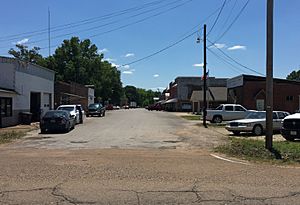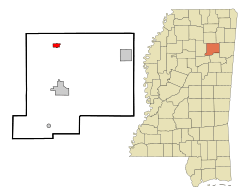New Houlka, Mississippi facts for kids
Quick facts for kids
New Houlka, Mississippi
|
|
|---|---|

Walker Street
|
|

Location of New Houlka, Mississippi
|
|
| Country | United States |
| State | Mississippi |
| County | Chickasaw |
| Area | |
| • Total | 1.23 sq mi (3.18 km2) |
| • Land | 1.23 sq mi (3.18 km2) |
| • Water | 0.00 sq mi (0.00 km2) |
| Population
(2020)
|
|
| • Total | 698 |
| • Density | 568.40/sq mi (219.50/km2) |
| Time zone | UTC-6 (Central (CST)) |
| • Summer (DST) | UTC-5 (CDT) |
| ZIP code |
38850
|
| Area code(s) | 662 |
| FIPS code | 28-51420 |
| GNIS feature ID | 671516 |
New Houlka (pronounced 'hull-kuh'), also known simply as Houlka, is a small town in Chickasaw County, Mississippi, United States. It was started in 1904 because a new railway line was built nearby. People moved their homes and businesses from the older settlement, now called "Old Houlka," to be closer to the train. In 2010, about 626 people lived there.
Old Houlka began as a place for trading animal furs before 1794. It is the oldest settlement that still exists in northern Mississippi. In the 1800s, much of the land was used for growing cotton. This made the market town quite busy.
Contents
History of New Houlka
Early Beginnings
This area was an important center for the Chickasaw people as early as the 1500s.
Settlers arrived in the late 1700s. They set up a Chickasaw Agency House in Houlka to trade with the Native Americans. In their first letters from 1794, agency workers called the settlement "Holkey."
Houlka was located where two old Native American trails crossed. These trails were the Natchez Trace and the Gaines Trace.
Growth and Changes
In 1805, a man named Silas Dinsmoor held a party at the Agency House. Important guests like future U.S. Representative John McKee and former U.S. Vice-President Aaron Burr attended. A post office opened in 1826.
Growing and processing cotton became the main way people made money. Many African people were forced to come to the region to work on these cotton farms. This cotton production brought wealth to some white farm owners.
During the American Civil War, soldiers from the Confederate side, led by General Samuel J. Gholson, fought with Federal troops near Houlka.
Houlka officially became a town in 1884. Houlka High School started in 1890 to educate white students. Around the same time, the Mississippi government passed new laws. These laws made it very hard for most Black people to vote or take part in the state's government. This continued until the 1960s.
The Move to New Houlka
In 1904, the Gulf and Ship Island Railroad built a train line. It went from New Albany to Pontotoc. This new line passed about one mile east of Houlka. Soon after, people started moving to "New Houlka," which was closer to the railway.
People moved their buildings from Old Houlka to New Houlka. They rolled the buildings on logs and used teams of oxen to pull them.
By 1906, New Houlka had a bank, three churches, a saw mill, a school, and a factory that made plows. About 500 people lived there. The town officially became a town that same year.
Later in the 1900s, many train lines closed because trucks started carrying more goods. In 2004, the railway line through New Houlka was no longer used. The tracks were removed, and a walking and biking path was built in its place. This path is called the "Tanglefoot Trail." It is now a place for recreation and health.
What's in a Name?
The exact meaning of the name Houlka is not fully clear. Some people think it comes from a Native American word meaning "low land" or "low water." Others believe it means "turkey."
Where is New Houlka?
New Houlka covers an area of about 1.2 square miles (3.2 square kilometers). All of this area is land.
People of New Houlka
| Historical population | |||
|---|---|---|---|
| Census | Pop. | %± | |
| 1970 | 646 | — | |
| 1980 | 710 | 9.9% | |
| 1990 | 558 | −21.4% | |
| 2000 | 710 | 27.2% | |
| 2010 | 626 | −11.8% | |
| 2020 | 698 | 11.5% | |
| U.S. Decennial Census | |||
In 2000, there were 710 people living in New Houlka. Most people were White (about 74%), and about 25% were African American. A small number of people were from other backgrounds.
There were 285 households in the town. About 34% of these homes had children under 18 living there. Many homes were made up of married couples. Some homes had a single mother with no husband present. About 32% of all homes had only one person living there.
The average age of people in the town was 34 years old. About 29% of the population was under 18. About 14% of people were 65 years or older.
The average income for a household in the town was about $20,417. For families, the average income was about $28,958. About 25% of the population lived below the poverty line. This included about 30% of children under 18 and 26% of people 65 or older.
Education in New Houlka
The Chickasaw County School District serves the town of New Houlka. The Houlka Attendance Center is located here. The old Houlka High School building is still standing today.
Famous People from New Houlka
- Charles Easley, a judge on the Mississippi Supreme Court
- Earl J. Hamilton, a historian (someone who studies history)
- Jim Hood, a former Attorney General for Mississippi (a top lawyer for the state)
See also
 In Spanish: New Houlka para niños
In Spanish: New Houlka para niños
 | Bayard Rustin |
 | Jeannette Carter |
 | Jeremiah A. Brown |

